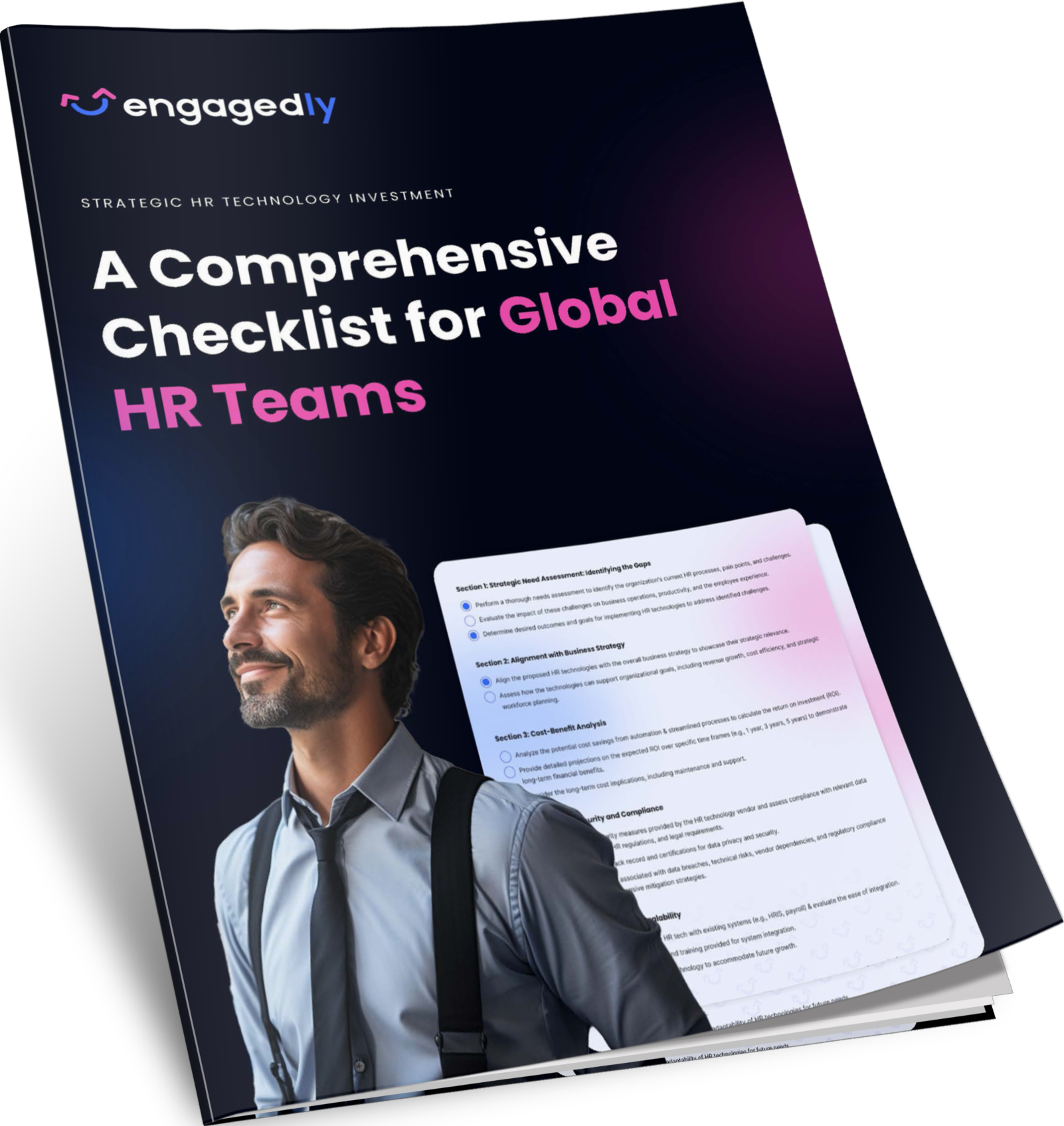In today’s globalized business world, the talent search has extended far beyond local borders. Recruiters are now targeting the global talent pool of candidates from various geographic regions and diverse cultural backgrounds. Tapping into this global talent pool allows recruitment teams to streamline their hiring process and reduce costs. It also grants organizations complete control over crucial processes such as onboarding and HR administration.
However, expanding business into international markets comes with both opportunities and challenges. Learning compliance and regulations associated with the international payroll system and building global teams can be complex and time-intensive. This blog aims to understand the purpose of a robust global staffing strategy and ways to implement it effectively.
What Is the Global Talent Pool?
 A global talent pool offers companies the opportunity to diversify their team. The talent pool comprises candidates from different countries and ethnicities interested in working with the organization and willing to relocate. Hiring and maintaining a global workforce helps companies strengthen their diversity and inclusion practices while enabling them to operate beyond their local boundaries.
A global talent pool offers companies the opportunity to diversify their team. The talent pool comprises candidates from different countries and ethnicities interested in working with the organization and willing to relocate. Hiring and maintaining a global workforce helps companies strengthen their diversity and inclusion practices while enabling them to operate beyond their local boundaries.
Candidates belonging to the global talent pool possess the relevant skills and experience to live and work in different countries. For example, someone in the US might apply for a project manager role based in the UK. Jobs with flexible working arrangements often depend on a global talent pool for smooth business operations.
Navigating Global Staffing Challenges
International business expansion is exciting. It enables businesses to access new markets and increase their revenue. Additionally, global mobility helps businesses gain competitive advantages in new markets, such as hiring top international talent, reducing operational costs, and saving taxes.
The benefits of tapping into the global market are indefinite. However, there are roadblocks along the way that can slow down global mobility and expansion. As organizations begin expansion beyond their local boundaries, one of the major challenges they face is navigating global staffing. Global staffing presents some of the following major challenges:
Finding the Right Talent
Talent sourcing involves identifying, researching, and attracting highly skilled candidates. It can be a challenging process, especially in the global recruitment landscape, where competition, language barriers, and cultural differences come into play.
Conducting the Recruitment Process
 When conducting virtual interviews, the hiring team may face challenges in assessing a candidate’s qualifications and cultural fit. While technology has bridged some of these gaps through video conferencing, evaluating soft skills and determining if a candidate aligns with the company culture can be challenging.
When conducting virtual interviews, the hiring team may face challenges in assessing a candidate’s qualifications and cultural fit. While technology has bridged some of these gaps through video conferencing, evaluating soft skills and determining if a candidate aligns with the company culture can be challenging.
Compliance with Local Laws
Different locations will have varying regulations regarding employment. The recruitment team should be trained on how to approach these legal obligations. An organization must know the following laws of the land:
- Termination laws
- Time-off policies
- Visa and work permit requirements
- Overtime rules
- Contractual or full-time employment laws
One way of eliminating the compliance risk is partnering with local HR experts (Employers of Records or EOR).
Culture Awareness
Awareness of different cultures is crucial when dealing with a diverse group of candidates in the global talent pool. It’s important to acknowledge cultural differences and provide employees with training on cultural awareness.
Additionally, it’s essential to establish effective communication channels for managing teams from various cultural backgrounds. Disrespecting or offending any culture can result in a disappointed or disengaged workforce and poor communication.
Differences in Time Zones
Although having a global team can help organizations expand and enhance their productivity, managing teams working across different time zones can be difficult. It makes scheduling meetings, asking for closing updates, organizing team engagement activities, and making dispersed teams work on a project challenging.
Here, an effective internal communication platform, frequent dissemination of information, flexible working hours, and regular reminders can be effective measures to mitigate the challenge.
International Relocation
When relocating an employee to a new country, the company must train the employee to cope with different customs, dialects, and environments. For a seamless relocation of employees, the recruitment team must assist their staff with acquiring visas and acclimatizing appropriately to the new culture. Additionally, companies should ensure establishing compliance with the new country’s initial immigration requirements, labor laws, and tax laws.
What Is a Global Talent Strategy?
 Devising a robust global talent acquisition strategy is crucial for companies looking to attract and hire the most suitable candidates for their business across different countries. Boston Consulting Group (BCG) has also highlighted the benefits of a diverse workforce in its publication. It also mentions how it can lead to increased innovative outcomes and improved financial performance.
Devising a robust global talent acquisition strategy is crucial for companies looking to attract and hire the most suitable candidates for their business across different countries. Boston Consulting Group (BCG) has also highlighted the benefits of a diverse workforce in its publication. It also mentions how it can lead to increased innovative outcomes and improved financial performance.
An effective global talent acquisition strategy can help businesses navigate all cultural and language barriers and find the right talent for the right job role and location. Here are six important steps to create an effective global talent acquisition strategy:
Global Hiring Needs Assessment
The assessment involves identifying the skill and knowledge gaps and the market the company aims to expand to. A comprehensive hiring needs assessment can help organizations identify suitable job locations and roles. Based on the assessment, companies can either plan to train the existing workforce (for international relocation) or hire new talent.
Research the Local Market
If a company plans to recruit from the local market and does not opt for international relocation, the next step would be to research the local market from where the candidate will be hired. This involves understanding the local job market’s nuances, labor laws, recruitment practices, and cultural differences.
The research should also include understanding the local customs and practices to avoid cultural faux pas and mitigate the chances of alienating a prospective candidate.
Customize Your Recruitment Strategy
Not all countries hire through the same channel. A few may prefer online job postings or outsourcing talent acquisition to a third-party vendor, while others prefer personal referrals.
Businesses must devise their recruitment strategy per the specific needs and preferences of the market. This will require understanding what attracts and motivates candidates in a particular location to develop a strong EVP (employee value proposition). For instance, flexible working arrangements or medical insurance may be a greater incentive in some countries or locations than salary or other monetary benefits.
Refine Your Selection Process
While tailoring your recruitment strategy, it is important to customize the interview or selection process. For example, a few countries may not appreciate including questions like ‘marital status,’ and ‘gender’ to be asked or included in the interview questionnaire. In other cases, a few countries or regions may find an applicant’s photo requirement in the application illegal.
Consider Relocation Packages
Relocating to a foreign location is always overwhelming for a candidate. It can be challenging in many ways – financially, mentally, and emotionally. Companies must ensure that if they plan to relocate an employee, they should offer the employee sufficient financial assistance, training support such as language and office etiquette training, and mental support.
Measure the Effectiveness of the Strategy
Devising a global recruitment strategy is not a one-time process; it needs continuous evaluation and modification as required. The global job market is dynamic, and so is the talent pool. A company must establish and evaluate key performance indicators (KPIs), such as retention rates, time-to-hire, and cost-per-hire, to identify areas for improvement and modify the strategy.
What Are the Advantages of a Global Talent Pool?
 Hiring international employees presents short-term and long-term benefits, such as unlocking doors to new markets, broadening your services, or tapping into a wide talent pool. Here’s a quick roundup of some of the benefits of hiring a global workforce:
Hiring international employees presents short-term and long-term benefits, such as unlocking doors to new markets, broadening your services, or tapping into a wide talent pool. Here’s a quick roundup of some of the benefits of hiring a global workforce:
- Attracts the top global talent
- Effective succession planning to fill key roles easily and effectively
- Ensures better alignment to business objectives, leading to better performance outcomes
- Increased diversity and inclusion
- Increased innovation, agility, and adaptability
Summing Up
The international talent acquisition process demands thoughtful planning and execution. It is vital in attracting and retaining the best talent across the countries. Engagedly offers a comprehensive and tailored recruitment platform to help businesses grow and expand. It is a cloud-based platform for organizations to understand the fine details of international mobility, including HR administration and regional laws. Schedule a demo today!

Frequently Asked Questions
Q1. What does ‘EOR’ mean?
Ans. EOR stands for Employer of Record. The HR service assists businesses with hiring internationally. EOR service providers serve as third-party contractors dealing with payroll, taxation process, employee work permit, compensation benefit, insurance, etc.
EORs help companies eliminate risks of HR-related issues when operating and recruiting in a different country. The service provider allows companies to tap into international markets while ensuring compliance.
Q2. How can integrating cloud-based recruitment software into an organization help implement a global recruitment strategy?
Ans. A robust recruitment software can assist businesses with distributed workforce models. Organizations must know local labor laws and compliance with employment regulations to hire remote teams worldwide. Recruitment software is tailored to match the country’s requirements where businesses wish to operate. The software can help businesses establish operations without setting up a local entity.
Q3. What are the 4 approaches to global staffing?
Ans. The four main approaches to international staffing are as under:
- Ethnocentric: Companies recruiting from the home country only
- Polycentric: Companies recruiting from the host country
- Geocentric: Companies recruiting candidates irrespective of their nationality
- Regiocentric: Companies recruiting from specific regions
Subscribe To The Engagedly Newsletter
Author
Srikant Chellappa
CEO & Co-Founder of Engagedly
Srikant Chellappa is the Co-Founder and CEO at Engagedly and is a passionate entrepreneur and people leader. He is an author, producer/director of 6 feature films, a music album with his band Manchester Underground, and is the host of The People Strategy Leaders Podcast. He is currently working on his next book, Ikigai at the Workplace, which is slated for release in the fall of 2024.











